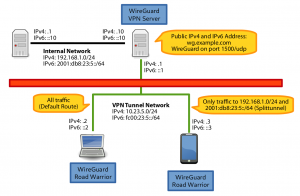WireGuard: A Breakthrough in Online Security
WireGuard: A Breakthrough in Online Security

It was almost two decades ago that VPN industry saw an upgrade in the tunneling protocols. The upgrade came in the form of OpenVPN, an open-source protocol that dominates the market to this day. I feel that with the development of WireGuard some significant progress and a breakthrough in online security has occurred.
WireGuard is a type of VPN that aims to be simpler than the current VPNs while offering a higher degree of security. It is a tool that is free and open source with GPLv2 license – same as Linux Kernel. Some experts are already backing WireGuard as the protocol that will dethrone OpenVPN as the market leader while others are much more skeptical. However, everything so far about this technology has shown great promise.
Do We Really Need Another VPN Protocol?
It’s a good question. Does the world really need more VPN protocols? I mean we already have IPSEC, PPTP, OpenVPN and an astonishing number proprietary SSL VPNs. More importantly, are VPNs that necessary to begin with? To answer the second question first, VPNs indeed are extremely useful tools. They provided an added layer of security to protect your data from external threats.
For instance, if you are running a business and have a website, buying SSL certification for your site with a Godaddy SSL coupon might give you a certain level of encryption. It will even help in increasing traffic and getting an SEO boost. But your website will remain exposed to online threats.
Using SSL VPN will give your employees a chance to access restricted resources remotely. It will completely stop unauthorized parties from eavesdropping on your network communication. Just like this, OpenVPN, L2TP and IPSEC have their own strengths.
What Makes the Difference in Online Security?
There are plenty of factors that make WireGuard standout. I will discuss some of them in details.
Higher Level of Encryption
WireGuard uses a process called “cryptokey routing” to secure user data. This is where the tool associates public keys with authorized IP addresses that are allowed inside the VPN tunnel.

When it comes to encryption standards and algorithm, WireGuard takes a completely new approach. Encryption algorithms that no other protocol even supports:
- ChaCha20 (authenticated with Poly1305)
- SipHash24 (hastable keys)
- BLAKE2s (hashing and keyed hashing)
- HKDF (key derivation)
- Curve25519 (ECDH)
It is important here to point out that the key length encryption of WireGuard is limited to 256 bits. Although this might concern some people, in all honesty, 256-bit is already more than enough. Keeping in mind that 256 bit encryption length means 1.15 x 1077 key combinations, the odds are stacked against anyone looking to break in.
There are no visible weaknesses with regards to protocols and encryption with this technology.
More Simplicity
Believe me when I tell you this, WireGuard’s simplicity is unprecedented. To start, this protocol is much simpler than OpenVPN because it takes up ridiculously lower lines of code. While OpenVPN takes up 600,000 line of code, WireGuard only takes up less than 4000. Yes, unprecedented is a good word to describe this difference.
With much smaller code, the chances of things going wrong and bugs impacting functionality becomes that much lower. Lean code also reduces the attack surface and exposure of the code to external threats. Finally, it is much easier and less time consuming for a person to audit a code with fewer lines than let’s say, when a code is filled out with hundreds of thousands lines more.
It’s obvious that the developer Jason Donenfeld believes that security through simplicity is the way to go.
Simple Handshakes
Up until now, asymmetrical encryption has been implying a principle called cryptographic agility. The agile crypto allows you to change out ciphers, diffie-hellmans and digests in order to bring forth upgrades.
On paper, this sounds like a tremendous idea. It will give you more options and change things for the better. Unfortunately, those options means a lot of stuff needs to negotiated between server and client before the final connection is made. And this leaves the door open for anyone in the position of MITM attack as they have more stuff to spy on.
WireGuard eliminates cryptographic agility for a much better alternative, crypto versioning. Let say, if a cryptographic attack against one of the protocol underlying primitives is revealed, a whole new version of WireGuard can be devised. After the update, client and server will only need to ditch the v1.0 for v.2.0 and continue on. In contrast, crypto agile negotiation would require client and server to negotiate and agree on each primitive and key length.
Some Issues That Needs To Be Addressed
WireGuard is free open-source that is still a work in progress. No final version of the protocol has been released as of yet and it has not went through a proper security audit. On the surface, WireGuard looks extremely promising but the jury is out until we see its final form.

Similarly, this tool was developed on Linux and the Windows version is yet to be released. Beta versions of WireGuard are out for macOS, Android and iOS but users of world’s biggest operating system are still waiting for their dedicated client.
Conclusion
Tick all the right boxes when searching for you VPN. Find a VPN that has plenty of people excited with its new cryptographic techniques, unique algorithms and simpler functionality. Personally, I feel this tool has the potential to bring forth excellent advancement in the world of online security.
However, it’s still early days. Issues such as Windows compatibility and a p security audit still remain unaddressed. But that’s just nitpicking as the final version this promising solution is still in works.
Final Remarks:
- WireGuard has brought game-changing improvements in VPN through unique algorithms and innovative cryptographic techniques.
- It is faster and much securer than any other VPN in the market.
- WireGuard has no support for Windows as of yet which puts it out of reach from millions of users.
The post WireGuard: A Breakthrough in Online Security appeared first on ReadWrite.
(119)

